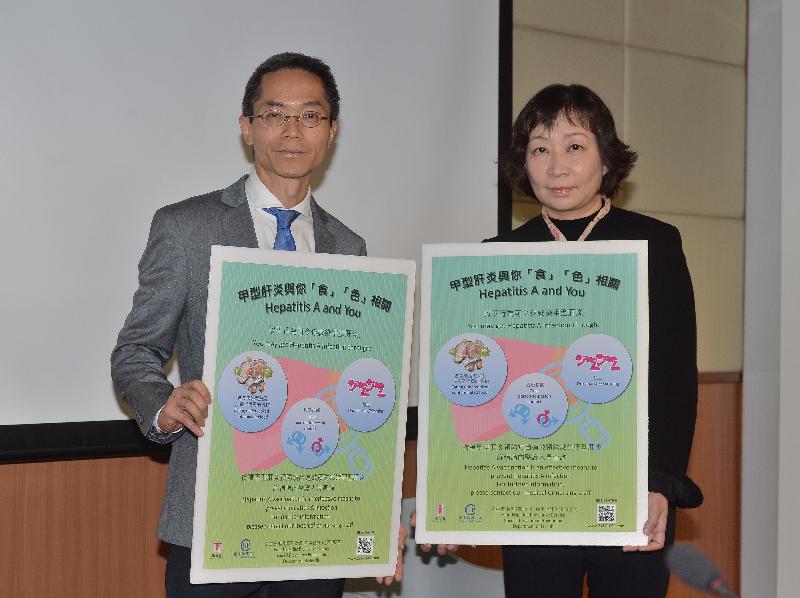Vaccination for high-risk male attendees to control hepatitis A outbreak (with photo)
*************************************************************************************
Speaking on the latest situation of hepatitis A at a press conference today, the Controller of the CHP, Dr Wong Ka-hing, said that since August 2016, an unusual increase in the number of hepatitis A cases affecting HIV-positive MSM attendees of the DH's Integrated Treatment Centre (ITC) had been detected. A total of 13 cases were recorded from September 2015 to 2017 as of the end of January, compared to generally zero to two per year from 2006 to 2015.
Epidemiologically, all patients are men aged from 26 to 48, with zero to three cases per month from August 2016. Clinically, five also had recent onset of sexually transmitted infections (STIs) such as syphilis, chlamydia infection and gonorrhoea.
"Our epidemiological investigations so far have not identified a common food or water source among these cases. With reference from overseas experience, our epidemiological and laboratory investigations coupled with their clinical presentations suggest that male person-to-person sexual transmission may have accounted for this hepatitis A outbreak," Dr Wong said.
"Hepatitis A vaccine is safe and effective in preventing the infection. The World Health Organization recommends hepatitis A vaccination for high-risk groups, such as travellers to endemic areas, MSM and chronic liver disease patients. To control the further spread of hepatitis A, as a one-off measure, the Government will provide two doses of hepatitis A vaccines, to be given at least six months apart, for target MSM for free from tomorrow (February 3)," Dr Wong said.
The vaccination arrangements for target MSM groups are as follows:
- The ITC (Tel: 2116 2888) will inform its current MSM attendees for vaccination;
- The AIDS Clinical Service of Queen Elizabeth Hospital (Tel: 3506 5855) and the Infectious Disease Special Medical Clinic of Princess Margaret Hospital (Tel: 6461 0613) will also inform their current HIV-positive MSM patients for vaccination; and
- Current MSM attendees of Wan Chai Male Social Hygiene Clinic (Tel: 3103 2400) and Yau Ma Tei Male Social Hygiene Clinic (Tel: 2359 4377) should attend the clinic for consultation and vaccination if appropriate.
In addition, the CHP will step up health education and publicity based on its Red Ribbon Centre's ongoing community programmes for MSM in collaboration with non-governmental organisations to raise their awareness of the risk of contracting hepatitis A via sexual transmission, promote safe sex, and encourage them to consult a doctor if necessary.
Letters to doctors and hospitals will be issued to alert the healthcare profession to the situation and heighten vigilance for early diagnosis and management. The CHP's Scientific Committee on AIDS and STI and Scientific Committee on Vaccine Preventable Diseases will meet later to follow up on the situation and update on prevention and control strategies.
Recent hepatitis A outbreaks affecting MSM were also observed in neighbouring and overseas areas. The European Centre for Disease Prevention and Control reported last December similar outbreaks in the United Kingdom, Spain, Italy and Germany. In Taiwan, apart from increase in hepatitis A cases, the Centers for Disease Control noted last September that over half of the patients had HIV or other STIs such as syphilis or gonorrhoea.
"We are concerned about this outbreak in Hong Kong and would like to appeal to eligible MSM attendees for vaccination in the public sector. Other MSM should consult their doctor if in doubt for vaccination in the private sector for personal protection. Vaccinating susceptible individuals together with safer sex and strict personal hygiene are key to preventing hepatitis A via sexual transmission," Dr Wong said.
"Our epidemiological investigations are ongoing to ascertain if the outbreak has spread to other MSM in the community. We shall closely monitor the situation by enhanced surveillance and clinical vigilance," Dr Wong added.
The public should also maintain food and environmental hygiene as hepatitis A is primarily transmitted faeco-orally from an infected person's stool to the water or food eaten by another person. It can be transmitted by eating contaminated food (especially shellfish) without thorough cooking and drinking contaminated water.
The public may visit the Hepatitis A page of the CHP and its Viral Hepatitis Preventive Service for more information.
Ends/Thursday, February 2, 2017
Issued at HKT 17:43
Issued at HKT 17:43
NNNN





